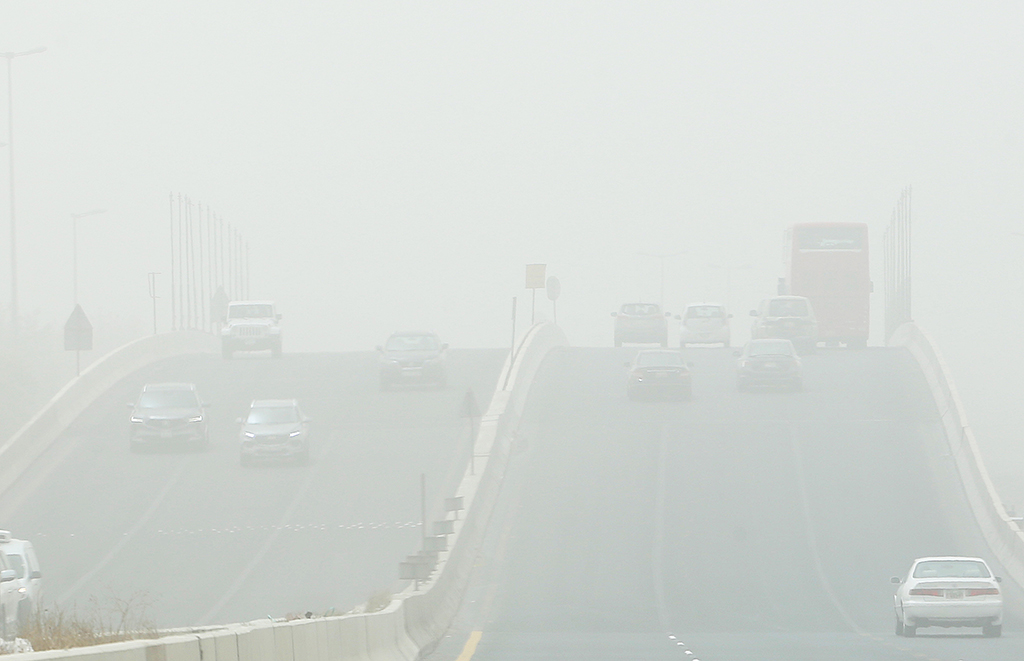By Faten Omar
KUWAIT: Kuwait Foundation for the Advancement of Sciences and Kuwait Aid Network organized on Wednesday a panel discussion on climate change and the quality of life in Kuwait. "Countries around the world have committed to reducing their carbon emissions and limit their effect on climate change. In Kuwait, we can no longer ignore its effects. As a country, we have already experienced its effects on our coastal settlements," Municipal Councilmember Sharifa Al-Shalfan said.
"Another effect is that Kuwait is now experiencing heavy rains during a short period of time, which places a large strain on the infrastructure, especially our rainwater drainage systems. We need to think of using porous materials that absorb water to alleviate the stress on infrastructure. It is also important to reuse the excess water, especially with our hot and arid climate," she pointed out.
"Our urban plan must prioritize its effect on the environment in terms of where we allocate residential and commercial areas, and how we link them through transport. The trick is to minimize transport distance and introduce multiple modes of transport alongside cars, such as an efficient public transport network, bike lanes and walkable streets," Shalfan said, stressing on the importance of prioritizing the quality of life of everyone living in Kuwait. "We hope to focus on green areas, better playgrounds for children and walkable streets."
Shalfan also aims to include green building concepts to limit the effect of the construction industry on climate change and at the same time save natural resources. She indicated that sand and dust storms are strongly related to climate change. "We must work together to tackle dust storms engulfing Kuwait. These dust storms are over certain areas, and we have to study this phenomenon to avoid building in those areas," she added.
Samia Al-Duaij, Sustainable Living Co-Founder, said climate change is no longer a problem that will happen in the future. "Rather, it is a problem we are dealing with now and it is happening now. Its effects are repeated and worse than at any time in human history. Natural disasters are not a new phenomenon; it's just that their intensity, severity and frequency that are causing alarm," she said.
"Locally, we all witnessed the intense and insane dust storms this year. Days of almost zero visibility on our roads, followed by a countrywide sauna in July when temperatures hit 52 C accompanied by extreme humidity. Hospital admissions went up during the summer from a combination of heat stress and respiratory ailments. The temperatures in Kuwait have increased by 1.8 C in the last 50 years; it is significantly higher than the global average," Duaij pointed out.
She added that water scarcity and droughts in neighboring countries are exacerbating dust storms and causing untold misery to millions of people in the region, stressing the need for serious action to resolve climate change, which requires a change in the complete overall current system and way of life to change it for the sake of future generations. "The alarm bells are deafening, and the evidence is irrefutable. It is an all-encompassing threat to health, agriculture, food security, water supply, transportation, energy and ecosystems. Non-Kuwaitis are at very high risk of death from increasingly hot temperatures. It is expected that the health disparity between citizens and non-citizens in Kuwait is set to widen as temperatures continue to rise because of climate change," she noted.
Duaij shared her positive view on how youth in Kuwait, activists, innovators, green entrepreneurs, large corporations, policymakers and local communities around the world are taking action. "More businesses and politicians are answering the call of climate activists, and perhaps most inspiringly, the cause is now being spearheaded by an amazing and united generation of young people across the world. And the youth of Kuwait are no different. The recent proliferation of environmental NGOs, activists, specialists, businesses and events like this makes me optimistic for the future and should give all of us hope," she said.
Duaij expressed joy over Arab countries' participation in climate change conferences. "The selection of Egypt and the UAE to host the UN climate conference COP27 and COP 28 in the next two years is expected to kickstart clean energy initiatives, sustainability drives, and better adaptation policies to ensure Arab countries have the resilience to face the expected impacts," she added.
During the conference, experts discussed climate change from the perspective of challenges to infrastructure systems and its impacts, challenges and policies. In the second panel, experts discussed water scarcity and sustainability, resources, industries, grassroots and planning. In the third session, they spoke about the quality of life in Kuwait, rights, health and urban development. The panel included topics about socioeconomic effects, health and well-being, justice and urbanism.











